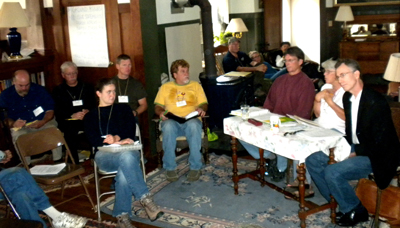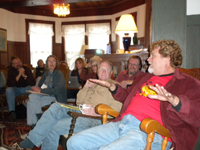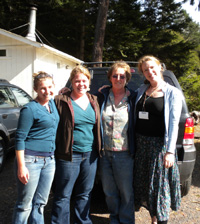CAMPAIGN PLANNING
The North Coast Stream Flow Campaign elements include:
• Public Education and Outreach: Media, Websites, Workshops, Schools/ Colleges/Universities, Other Presentations, etc.
• Citizen Mobilization: Streamflow Monitoring, Enforcement Complaints, Action Alerts, etc.
• Government (Policy) Advocacy
-
• Litigation (Targeted)
-
• Statewide Organizing and Coordination
2015 Work Plan
Final Draft with priorities
Orange = top priority; Yellow = second priority; Blue = third priority; Clear = 4th priority
υPublic Education and targeted outreach are key elements of our work. Public education and outreach in 2015 will focus on:
1.Creating and distributing a primer on how to develop and file Public Trust Complaints focused on illegal water development and use with the SWRCB and DFW. Also, conducting one or more workshops to train Coalition member groups, other organizations, activists and concerned citizens on how to develop, write and file effective Public Trust Complaints.
2.Educating the public about the connection between groundwater and surface water which are, as USGS has pointed out, a single resource.
3.Preparing citizens and communities for local and regional groundwater planning pursuant to the groundwater legislation which recently became law. We will focus on those North Coast groundwater basins identified by the state as high and moderate priority for groundwater planning and regulation. These are the basins which under the recently passed legislation are mandated to undertake groundwater planning and regulation.
4.Outreach to real estate agents and firms to inform them about the importance of disclosing water rights and/or limitations on water development associated with properties which are on the market as well as educating them on how to obtain accurate information on water rights and water development limitations associated with particular properties.
υWork to develop and pass state legislation needed to build on and improve groundwater legislation passed this year. This would be a continuation of what was a major focus for the Coalition in 2014. Efforts would likely include:
◦Requiring those extracting groundwater to report to the State Water Resources Control Board on an annual basis the amount or groundwater they extracted.
◦Declaring groundwater extraction well logs public information and assuring that well logs are readily available to the public.
◦Creating a state program to restore stream flows by purchase and retirement of water rights and dedication of that water to in-stream use. Purchase and retirement of groundwater extraction facilities which are negatively impacting streamflow could also be included.
◦ Funding for the SWRCB to develop Public Trust flow determinations for North Coast streams and/or for streams which support ESA and/or C-ESA listed species and deadlines for the SWRCB to adopt Public Trust flow determinations for specific streams.
υParticipate in the development of water board permitting programs for vineyards by the SF Bay and North Coast Regional Water Quality Control Boards.
υExtend to the SF Bay the stream flow analysis Eli Assarian performed for NMFS for streams within the range of SONC Coho salmon.
υSupport the work of Linda Sheehan focused on obtaining flow-impaired CWA listings for North Coast streams.
υProvide a strong "voice" for the North Coast in the deliberations and decisions of the State Water Resources Control Board including but not limited to:
1.Petition the Board or file a Public Trust Complaint using Eli Assarian’s flow assessment work for NMFS requesting that the Board address stream flow depletions which are not the result of changes in precipitation.
2.Petition the SWRCB to create and adopt Public Trust flow determinations based on the best available scientific information and expert opinion. Use Eli Assarian’s study for NMFS to prioritize streams for PT flow determination; streams with the greatest flow depletions not related to precipitation would be the top priority for PT flow determination.
3.Assisting Coalition member organizations and other concerned citizens and organizations in filing Public Trust complaints for excessive and illegal diversion and use of water in a manner which negatively impacts stream flow.
υWork with appropriate NMFS officials to develop a list of streams on which NMFS will recommend the SWRCB curtail irrigation to protect ESA listed Salmonids during future drought emergencies.
υContinue to provide a forum for Coalition member organizations and activists to share information, strategies, tactics, organizing and technical skills and to develop and implement collective and coordinated action to protect and restore stream flows.
PLANNING RETREAT
A stellar retreat was held at the Jughandle and Nature Center on the Mendocino Coast on the weekend of October 16-18. In addition to conducting business, participants greatly enjoyed each others company and great food highlighted by the fresh barbequed albacore dinner on Saturday night prepared by retreat participant Craig Bell. During the day on Saturday and Sunday, the North Coast environmental activists assembled developed a framework for a coalition to get water back in our rivers and to help start a movement that promotes public trust protection
We shared case studies about the pervasive problem of lack of enforcement of laws protecting stream flows and fisheries. Magnificent North Coast rivers that once teamed with salmon are now dry for months each year. While learning the extent of the problem was somewhat depressing, the actions different groups have taken in response to the problem was inspiring.
Over the course of the weekend discussions ranged from legal strategies, public education, citizen monitoring and successful techniques for grassroots organizing. A panel discussion with attorneys Paul Carroll, Sharon Duggan, and Tom Lippe was among the highlights and lively discussions followed.
Facilitation expert Betsy Watson brought a team of professionals and interns and their skills allowed us to communicate better with each other and to get down to the business of planning how we will work together to be more effective on behalf of public trust protection.
Katie Glover put together notes from the retreat that recap discussions and highlight decisions. The group decided on provisional guidelines for coalition formation and decision making and those are being formulated and will be circulated to retreat participants and other potential members. The retreat also provide the basis for a Campaign Plan going forward that will be reviewed by coalition members.

CREATING A CAMPAIGN PLAN
All organizations which opt to join the coalition will be involved in reviewing and commenting on Campaign Plan drafts. Through this iterative process we will arrive at a Campaign Plan that has buy in from all coalition members. The steering committee selected for governance will be tasked with overseeing implementation of the Campaign Plan and will be involved in fundraising for the Campaign.
Retreat recordings will be transcribed to fully document proceedings of the meeting and to provide a basis for reviewing discussions so that the intentions of retreat participants can be reflected accurately in elements of the Campaign Plan. The North Coast River Flow Campaign Plan will be finalized by responding to comments from all cooperators and a final vote of the steering committee.
POWER MAPPING SOURCES

